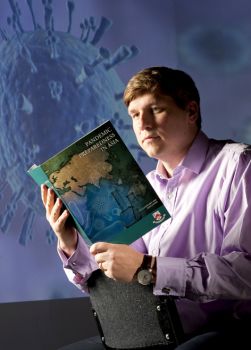Broadcast: News items
Publish and be damned? Sussex debates the bird-flu research controversy
Posted on behalf of: Centre for Global Health Policy
Last updated: Tuesday, 15 May 2012

Professor Stefan Elbe
Should scientists researching bird flu be censored?
That’s the question that will be put to a panel of distinguished international experts at a public debate on Tuesday (22 May) organised by the Centre for Global Health Policy.
The event is prompted by recent controversy but addresses wider questions involving science ethics and security.
Research into the H5N1 virus (avian, or bird flu) published this month shows how the virus can be mutated in a laboratory to create a contagious form that can infect and be passed to and from mammals.
Previously, the cause of bird flu infection in humans was traced to very close contact with infected birds. Around 60 per cent of people infected with the virus have died.
The now-published research shows how close the virus could be to evolving into a form that could be spread directly from human to human.
Publication of the studies by two separate scientists were first delayed last year following a controversy that the methodology and findings of both research projects might put humans at risk if used, for example, by bioterrorists.
Both scientists had publication postponed and their papers censored as a result of the ethical and security concerns raised, and both were embroiled in wrangles that involved having their work censored and subject to government interference.
But both research projects could also do much to inform science’s understanding of the evolution of such viruses and allow development of vaccines to prevent devastating epidemics.
So how do we balance the competing pressures of research value and risk, and just what right do governments have in censoring and controlling the publication of new science?
The panelists discussing these questions are:
- Professor Harvey Rubin, Director of the Institute for Strategic Threat Analysis and Response at UPenn, who has served on the National Science Advisory Board for Biosecurity
- Professor David Heymann, Chairman of the Health Protection Agency and Head of the Centre on Global Health Security at Chatham House
- Professor Bobbie Farsides, Professor of Clinical and Biomedical Ethics at the Brighton and Sussex Medical School
- Dr Caitriona McLeish, a Senior Fellow in the Science and Technology Policy Research Unit (SPRU) and co-director of the Harvard-Sussex Program.
Stefan Elbe, Professor of International Relations and Director of the Centre for Global Health Policy in the School of Global Studies, says: “The stakes are very high for researchers and universities, given that this debate goes to the heart of how research is governed, and whether scientists feel that they have the freedom to pursue the scientific work they think is important.
“That is why in our debate we have invited experts from the NSABB (Rubin), on health security and the WHO (Heymann), on biomedical research ethics (Farsides), and on dual-use research (McLeish).
“We hope it will provide the audience with a better understanding of the stakes and complexities of the issue.”
Researching A Deadly Virus: Science, security and the H5N1 controversy starts at 4pm in the Fulton building.

